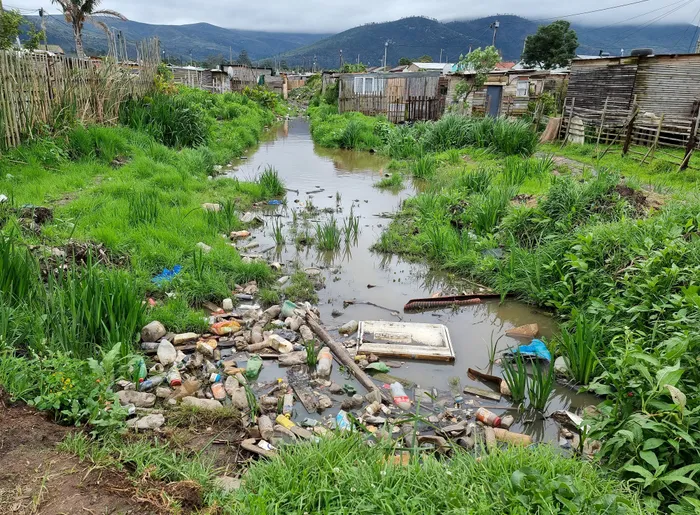Municipalities must be held accountable

Picture: David Ritchie/African News Agency (ANA) – Badly littered canals and waterways in the Kurland Village have caused blocked sewer pipes resulting in raw sewerage flowing into the Buffels River. The local pump station motor does not have backup power or a generator and therefore cannot run during loadshedding, contributing to the problem with sewage spills. According to Wikipedia: ‘Kurland (often referred to as Kurland Village) is a rural township in the Garden Route District Municipality in the Western Cape province of South Africa. Located in the Crags area on the edge of the Tsitsikamma Nature Reserve, 20 km from Plettenberg Bay, it is affected by high levels of unemployment and domestic violence.’
By Xola Pakati
The upcoming inaugural Council of Mayors Summit to be hosted by the South African Local Government Association (SALGA) in East London, South Africa, on September 8 - 9 will most certainly seek to address challenges experienced at local government structures. It will serve as a platform for peer learning and sharing best practices in governance.
At the current juncture, all municipalities in South Africa, and perhaps across the rest of the African continent, are confronted by unfortunate challenges as a result of Covid-19, drought, and natural disasters such as storms and flooding.
The poor financial state of municipalities, low levels of revenue collection, unemployment, poverty, crime, and cable theft are realities that have become common in most of our municipalities.
While it is obvious that Covid-19 has thrown the world into disarray, more of the economic damage will forever be felt, particularly in areas that have already been disadvantaged prior to the pandemic.
South Africa’s job market was already facing challenges way before the pandemic hit our shores. Corruption and governance failures in different spheres of government and the private sector were also prevalent before Covid-19.
The question remains then – what will be the best practices when doom and gloom seem to be the only narrative?
Late in August 2022 Stats SA revealed that the country’s unemployment rate stood at 33.9 percent in the second quarter of the year, marking a 0.6 percent decline in the data from 4.5 percent in the first quarter.
With the slight shift in the overall number of people with jobs – there are now 15.6 million employed people in the labour market. Even good news is received with disbelief, and we forget the strides that have been made to get to that picture.
With the labour force participation rate increasing by 1.7 percent to 58.6 percent in the second quarter – the figures for both employed and unemployed people increased during the term.
Every year Stats SA requests that municipalities provide information on the extent of their operations, particularly on their service delivery efforts. The local government is primarily responsible for providing water, electricity, sewerage, sanitation, and refuse removal services to homes, businesses and industries across the country.
The release of the 2020 Non-Financial Census for Municipalities (NFCM) was encouraging to note that access to all trading services, namely water and sanitation services, electricity services, and waste management services have increased over the period of consideration (between 2019 and 2020).
Access to sanitation has increased by 4.3 percent, and water by 3.9 percent. There has been an increase 2.3 percent of consumer units receiving electricity services and a 2.3 percent increase in waste services in 2020 as compared to the year 2019.
This is vital as water and sanitation services are rights-based basic services. This tells us that, despite the many challenges faced by local government, Water Services Authorities are hard at work to ensure increasing access to water and sanitation in all communities in South Africa.
In real terms this means people who have never had these basic services in their homes, now have access; this is an important milestone in realising the ideals cherished in our Constitution.
While some level of service is better than no service, municipalities are all hard at work to increase the level of service especially for sanitation. It is not desirable to see an increase in the provision of bucket toilets (prevalent in informal settlements), we collectively understand the need for dignity in the provision of sanitation services and more effort must be put into ensuring the dignity of all our communities.
As mayors gather, they must insist on innovative solutions and push for policies to ensure that as the country emerges from this governance and economic crises post-Covid -19, we pull each other together as peers of good governance.
The Auditor General of South Africa (AGSA) report on Municipal Audit outcomes for 2020/2021 financial year called for capable leaders to demonstrate change by strengthening transparency and accountability.
The SCoM will in part focus on the state of municipal finances and come up with measures to address challenges related to municipal financial management and sustainability.
We owe it to ourselves and those that elected us to ensure that we remain accountable and responsive to the forever-changing local and global demands imposed on us.
We remain cognisant that there are no easy solutions to reigniting a Covid-19-affected economy.
Accelerating service delivery, water provision, and sanitation, good road networks, public health, reducing unemployment, crime, poverty, and corruption, and ending cable and copper theft, and any other economic crimes are non-negotiable.
Pakati is the Deputy President of SALGA and an Executive Mayor of Buffalo City Metro Municipality.